Mental Health Nursing: Reflection on Personal Beliefs and Learnings
VerifiedAdded on 2023/06/08
|7
|1525
|69
Essay
AI Summary
This essay is a reflective piece on the author's evolving understanding of mental health nursing. The author begins by outlining their initial beliefs, opinions, and values regarding mental health and illness, which included misconceptions about who is affected by mental disorders, the perceived violent nature of individuals with mental health issues, and the association of mental illness with demonic possession. The essay then details how these beliefs have changed over the course of a nursing program, specifically during the past five weeks, through course readings, lectures, and experiences. The author references research findings to counter their initial assumptions, emphasizing the commonality of mental health issues, the low percentage of violent individuals, and the lack of connection between mental illness and demonic forces. The conclusion stresses the importance of basing nursing practice on scientific facts rather than myths and conspiracy theories, and it emphasizes the need for nurses to continuously update their knowledge and understanding of mental health.
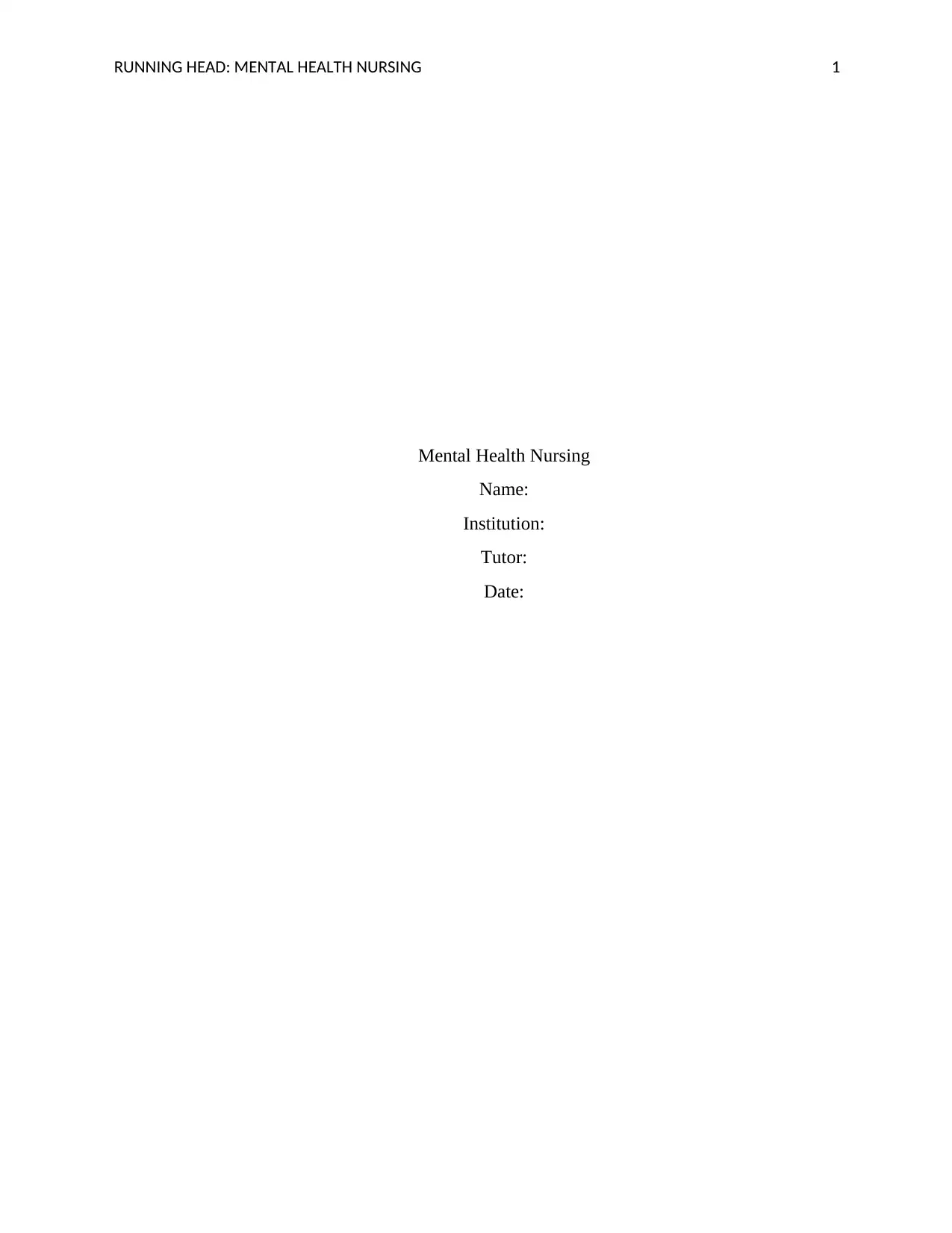
RUNNING HEAD: MENTAL HEALTH NURSING 1
Mental Health Nursing
Name:
Institution:
Tutor:
Date:
Mental Health Nursing
Name:
Institution:
Tutor:
Date:
Paraphrase This Document
Need a fresh take? Get an instant paraphrase of this document with our AI Paraphraser
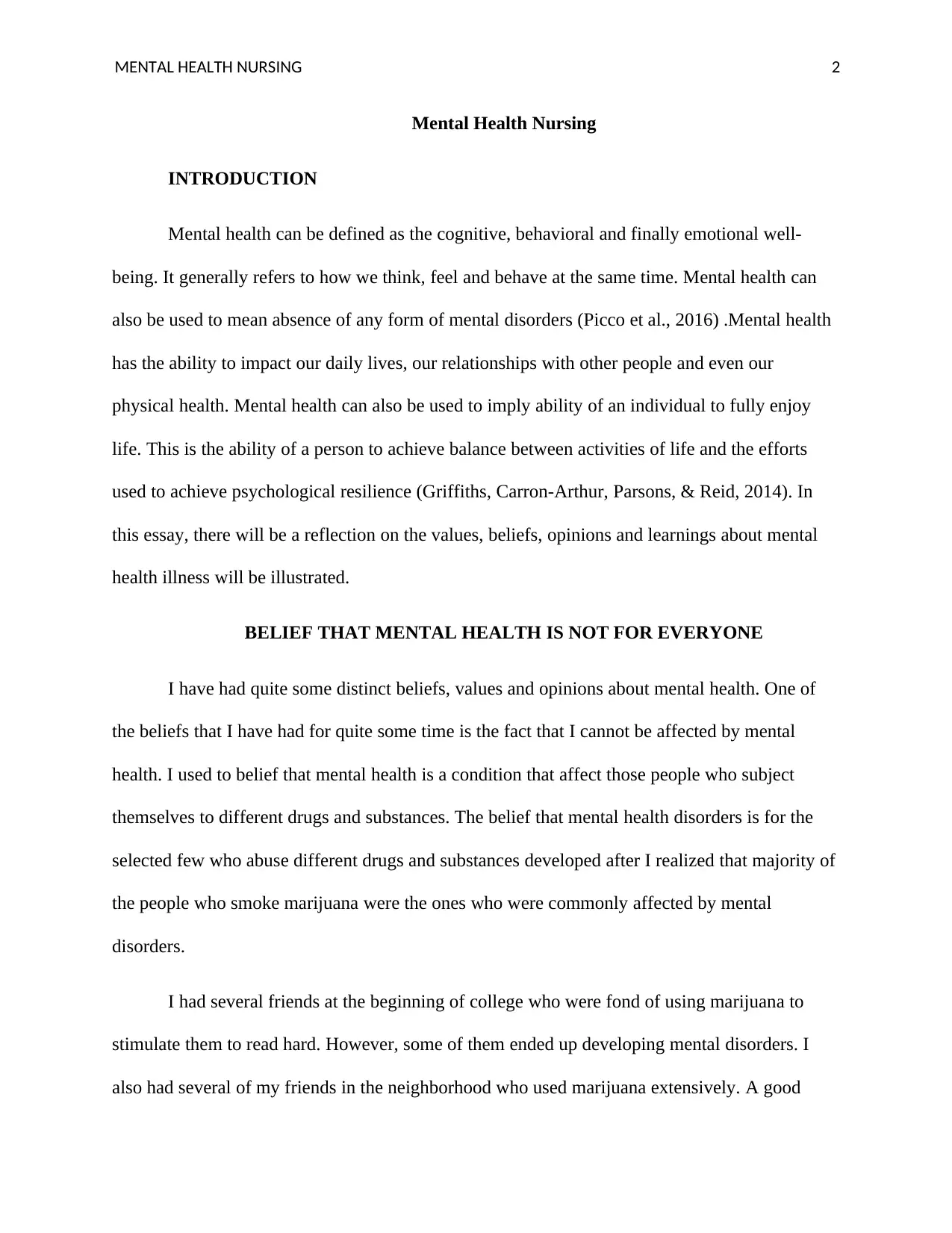
MENTAL HEALTH NURSING 2
Mental Health Nursing
INTRODUCTION
Mental health can be defined as the cognitive, behavioral and finally emotional well-
being. It generally refers to how we think, feel and behave at the same time. Mental health can
also be used to mean absence of any form of mental disorders (Picco et al., 2016) .Mental health
has the ability to impact our daily lives, our relationships with other people and even our
physical health. Mental health can also be used to imply ability of an individual to fully enjoy
life. This is the ability of a person to achieve balance between activities of life and the efforts
used to achieve psychological resilience (Griffiths, Carron-Arthur, Parsons, & Reid, 2014). In
this essay, there will be a reflection on the values, beliefs, opinions and learnings about mental
health illness will be illustrated.
BELIEF THAT MENTAL HEALTH IS NOT FOR EVERYONE
I have had quite some distinct beliefs, values and opinions about mental health. One of
the beliefs that I have had for quite some time is the fact that I cannot be affected by mental
health. I used to belief that mental health is a condition that affect those people who subject
themselves to different drugs and substances. The belief that mental health disorders is for the
selected few who abuse different drugs and substances developed after I realized that majority of
the people who smoke marijuana were the ones who were commonly affected by mental
disorders.
I had several friends at the beginning of college who were fond of using marijuana to
stimulate them to read hard. However, some of them ended up developing mental disorders. I
also had several of my friends in the neighborhood who used marijuana extensively. A good
Mental Health Nursing
INTRODUCTION
Mental health can be defined as the cognitive, behavioral and finally emotional well-
being. It generally refers to how we think, feel and behave at the same time. Mental health can
also be used to mean absence of any form of mental disorders (Picco et al., 2016) .Mental health
has the ability to impact our daily lives, our relationships with other people and even our
physical health. Mental health can also be used to imply ability of an individual to fully enjoy
life. This is the ability of a person to achieve balance between activities of life and the efforts
used to achieve psychological resilience (Griffiths, Carron-Arthur, Parsons, & Reid, 2014). In
this essay, there will be a reflection on the values, beliefs, opinions and learnings about mental
health illness will be illustrated.
BELIEF THAT MENTAL HEALTH IS NOT FOR EVERYONE
I have had quite some distinct beliefs, values and opinions about mental health. One of
the beliefs that I have had for quite some time is the fact that I cannot be affected by mental
health. I used to belief that mental health is a condition that affect those people who subject
themselves to different drugs and substances. The belief that mental health disorders is for the
selected few who abuse different drugs and substances developed after I realized that majority of
the people who smoke marijuana were the ones who were commonly affected by mental
disorders.
I had several friends at the beginning of college who were fond of using marijuana to
stimulate them to read hard. However, some of them ended up developing mental disorders. I
also had several of my friends in the neighborhood who used marijuana extensively. A good
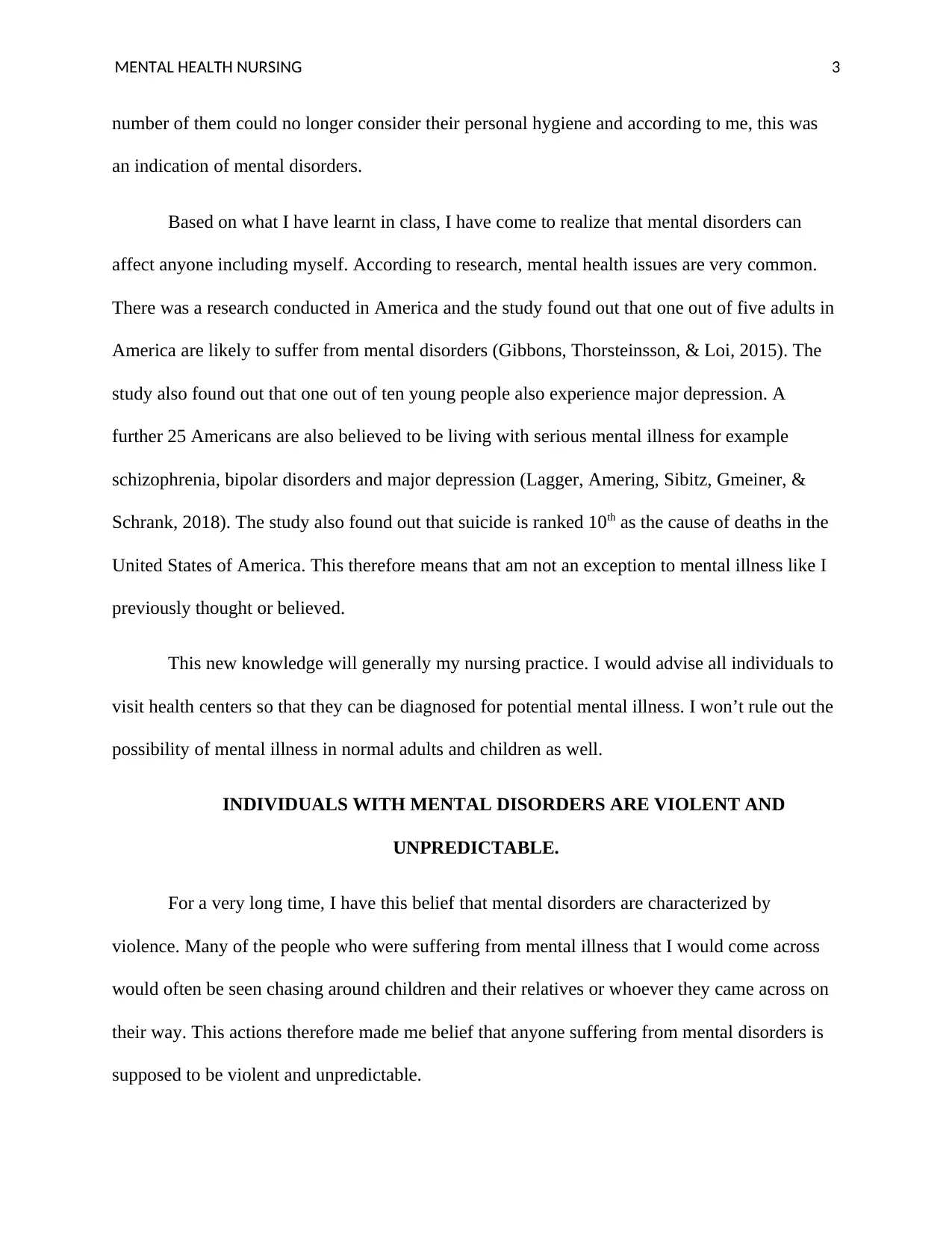
MENTAL HEALTH NURSING 3
number of them could no longer consider their personal hygiene and according to me, this was
an indication of mental disorders.
Based on what I have learnt in class, I have come to realize that mental disorders can
affect anyone including myself. According to research, mental health issues are very common.
There was a research conducted in America and the study found out that one out of five adults in
America are likely to suffer from mental disorders (Gibbons, Thorsteinsson, & Loi, 2015). The
study also found out that one out of ten young people also experience major depression. A
further 25 Americans are also believed to be living with serious mental illness for example
schizophrenia, bipolar disorders and major depression (Lagger, Amering, Sibitz, Gmeiner, &
Schrank, 2018). The study also found out that suicide is ranked 10th as the cause of deaths in the
United States of America. This therefore means that am not an exception to mental illness like I
previously thought or believed.
This new knowledge will generally my nursing practice. I would advise all individuals to
visit health centers so that they can be diagnosed for potential mental illness. I won’t rule out the
possibility of mental illness in normal adults and children as well.
INDIVIDUALS WITH MENTAL DISORDERS ARE VIOLENT AND
UNPREDICTABLE.
For a very long time, I have this belief that mental disorders are characterized by
violence. Many of the people who were suffering from mental illness that I would come across
would often be seen chasing around children and their relatives or whoever they came across on
their way. This actions therefore made me belief that anyone suffering from mental disorders is
supposed to be violent and unpredictable.
number of them could no longer consider their personal hygiene and according to me, this was
an indication of mental disorders.
Based on what I have learnt in class, I have come to realize that mental disorders can
affect anyone including myself. According to research, mental health issues are very common.
There was a research conducted in America and the study found out that one out of five adults in
America are likely to suffer from mental disorders (Gibbons, Thorsteinsson, & Loi, 2015). The
study also found out that one out of ten young people also experience major depression. A
further 25 Americans are also believed to be living with serious mental illness for example
schizophrenia, bipolar disorders and major depression (Lagger, Amering, Sibitz, Gmeiner, &
Schrank, 2018). The study also found out that suicide is ranked 10th as the cause of deaths in the
United States of America. This therefore means that am not an exception to mental illness like I
previously thought or believed.
This new knowledge will generally my nursing practice. I would advise all individuals to
visit health centers so that they can be diagnosed for potential mental illness. I won’t rule out the
possibility of mental illness in normal adults and children as well.
INDIVIDUALS WITH MENTAL DISORDERS ARE VIOLENT AND
UNPREDICTABLE.
For a very long time, I have this belief that mental disorders are characterized by
violence. Many of the people who were suffering from mental illness that I would come across
would often be seen chasing around children and their relatives or whoever they came across on
their way. This actions therefore made me belief that anyone suffering from mental disorders is
supposed to be violent and unpredictable.
⊘ This is a preview!⊘
Do you want full access?
Subscribe today to unlock all pages.

Trusted by 1+ million students worldwide
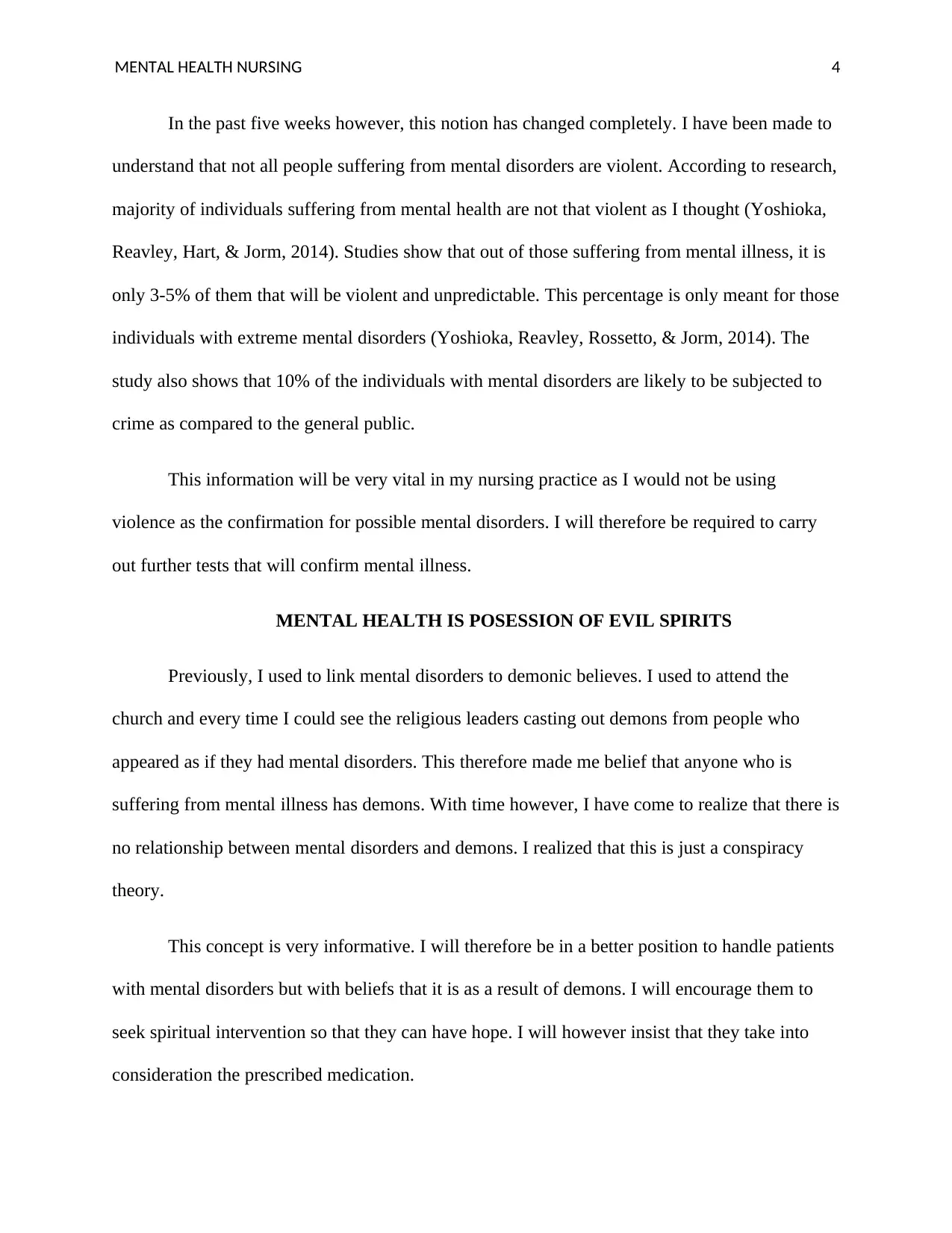
MENTAL HEALTH NURSING 4
In the past five weeks however, this notion has changed completely. I have been made to
understand that not all people suffering from mental disorders are violent. According to research,
majority of individuals suffering from mental health are not that violent as I thought (Yoshioka,
Reavley, Hart, & Jorm, 2014). Studies show that out of those suffering from mental illness, it is
only 3-5% of them that will be violent and unpredictable. This percentage is only meant for those
individuals with extreme mental disorders (Yoshioka, Reavley, Rossetto, & Jorm, 2014). The
study also shows that 10% of the individuals with mental disorders are likely to be subjected to
crime as compared to the general public.
This information will be very vital in my nursing practice as I would not be using
violence as the confirmation for possible mental disorders. I will therefore be required to carry
out further tests that will confirm mental illness.
MENTAL HEALTH IS POSESSION OF EVIL SPIRITS
Previously, I used to link mental disorders to demonic believes. I used to attend the
church and every time I could see the religious leaders casting out demons from people who
appeared as if they had mental disorders. This therefore made me belief that anyone who is
suffering from mental illness has demons. With time however, I have come to realize that there is
no relationship between mental disorders and demons. I realized that this is just a conspiracy
theory.
This concept is very informative. I will therefore be in a better position to handle patients
with mental disorders but with beliefs that it is as a result of demons. I will encourage them to
seek spiritual intervention so that they can have hope. I will however insist that they take into
consideration the prescribed medication.
In the past five weeks however, this notion has changed completely. I have been made to
understand that not all people suffering from mental disorders are violent. According to research,
majority of individuals suffering from mental health are not that violent as I thought (Yoshioka,
Reavley, Hart, & Jorm, 2014). Studies show that out of those suffering from mental illness, it is
only 3-5% of them that will be violent and unpredictable. This percentage is only meant for those
individuals with extreme mental disorders (Yoshioka, Reavley, Rossetto, & Jorm, 2014). The
study also shows that 10% of the individuals with mental disorders are likely to be subjected to
crime as compared to the general public.
This information will be very vital in my nursing practice as I would not be using
violence as the confirmation for possible mental disorders. I will therefore be required to carry
out further tests that will confirm mental illness.
MENTAL HEALTH IS POSESSION OF EVIL SPIRITS
Previously, I used to link mental disorders to demonic believes. I used to attend the
church and every time I could see the religious leaders casting out demons from people who
appeared as if they had mental disorders. This therefore made me belief that anyone who is
suffering from mental illness has demons. With time however, I have come to realize that there is
no relationship between mental disorders and demons. I realized that this is just a conspiracy
theory.
This concept is very informative. I will therefore be in a better position to handle patients
with mental disorders but with beliefs that it is as a result of demons. I will encourage them to
seek spiritual intervention so that they can have hope. I will however insist that they take into
consideration the prescribed medication.
Paraphrase This Document
Need a fresh take? Get an instant paraphrase of this document with our AI Paraphraser
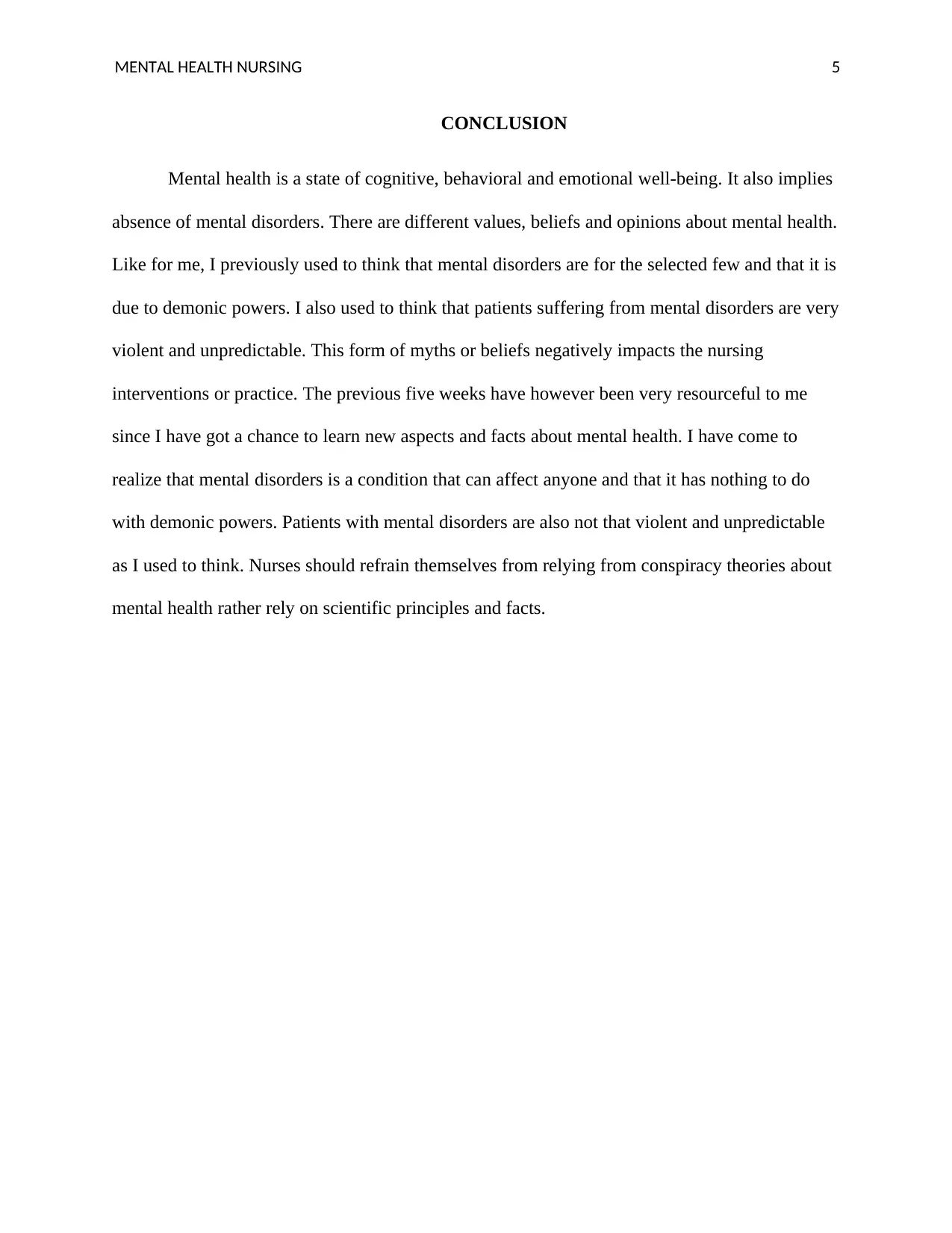
MENTAL HEALTH NURSING 5
CONCLUSION
Mental health is a state of cognitive, behavioral and emotional well-being. It also implies
absence of mental disorders. There are different values, beliefs and opinions about mental health.
Like for me, I previously used to think that mental disorders are for the selected few and that it is
due to demonic powers. I also used to think that patients suffering from mental disorders are very
violent and unpredictable. This form of myths or beliefs negatively impacts the nursing
interventions or practice. The previous five weeks have however been very resourceful to me
since I have got a chance to learn new aspects and facts about mental health. I have come to
realize that mental disorders is a condition that can affect anyone and that it has nothing to do
with demonic powers. Patients with mental disorders are also not that violent and unpredictable
as I used to think. Nurses should refrain themselves from relying from conspiracy theories about
mental health rather rely on scientific principles and facts.
CONCLUSION
Mental health is a state of cognitive, behavioral and emotional well-being. It also implies
absence of mental disorders. There are different values, beliefs and opinions about mental health.
Like for me, I previously used to think that mental disorders are for the selected few and that it is
due to demonic powers. I also used to think that patients suffering from mental disorders are very
violent and unpredictable. This form of myths or beliefs negatively impacts the nursing
interventions or practice. The previous five weeks have however been very resourceful to me
since I have got a chance to learn new aspects and facts about mental health. I have come to
realize that mental disorders is a condition that can affect anyone and that it has nothing to do
with demonic powers. Patients with mental disorders are also not that violent and unpredictable
as I used to think. Nurses should refrain themselves from relying from conspiracy theories about
mental health rather rely on scientific principles and facts.
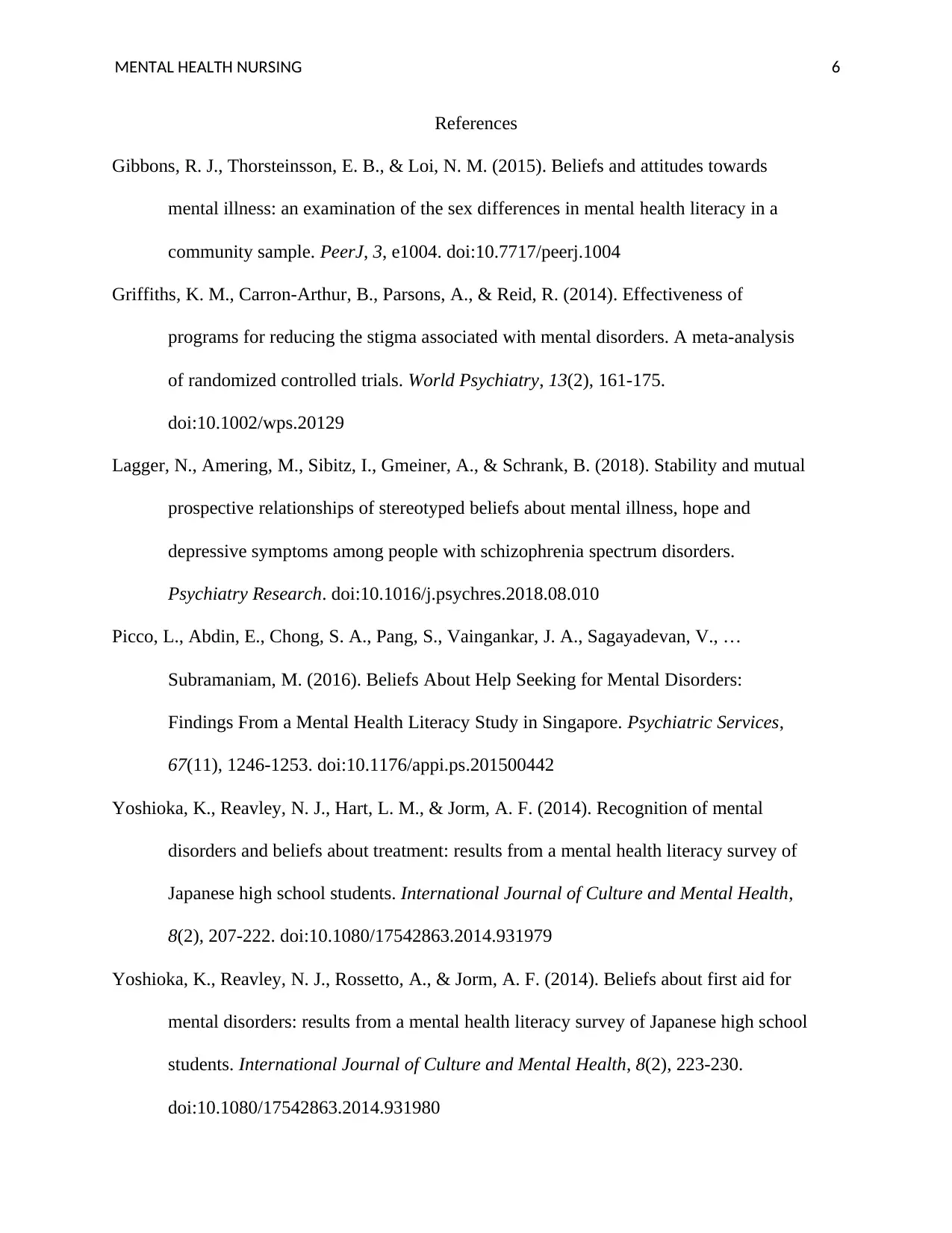
MENTAL HEALTH NURSING 6
References
Gibbons, R. J., Thorsteinsson, E. B., & Loi, N. M. (2015). Beliefs and attitudes towards
mental illness: an examination of the sex differences in mental health literacy in a
community sample. PeerJ, 3, e1004. doi:10.7717/peerj.1004
Griffiths, K. M., Carron-Arthur, B., Parsons, A., & Reid, R. (2014). Effectiveness of
programs for reducing the stigma associated with mental disorders. A meta-analysis
of randomized controlled trials. World Psychiatry, 13(2), 161-175.
doi:10.1002/wps.20129
Lagger, N., Amering, M., Sibitz, I., Gmeiner, A., & Schrank, B. (2018). Stability and mutual
prospective relationships of stereotyped beliefs about mental illness, hope and
depressive symptoms among people with schizophrenia spectrum disorders.
Psychiatry Research. doi:10.1016/j.psychres.2018.08.010
Picco, L., Abdin, E., Chong, S. A., Pang, S., Vaingankar, J. A., Sagayadevan, V., …
Subramaniam, M. (2016). Beliefs About Help Seeking for Mental Disorders:
Findings From a Mental Health Literacy Study in Singapore. Psychiatric Services,
67(11), 1246-1253. doi:10.1176/appi.ps.201500442
Yoshioka, K., Reavley, N. J., Hart, L. M., & Jorm, A. F. (2014). Recognition of mental
disorders and beliefs about treatment: results from a mental health literacy survey of
Japanese high school students. International Journal of Culture and Mental Health,
8(2), 207-222. doi:10.1080/17542863.2014.931979
Yoshioka, K., Reavley, N. J., Rossetto, A., & Jorm, A. F. (2014). Beliefs about first aid for
mental disorders: results from a mental health literacy survey of Japanese high school
students. International Journal of Culture and Mental Health, 8(2), 223-230.
doi:10.1080/17542863.2014.931980
References
Gibbons, R. J., Thorsteinsson, E. B., & Loi, N. M. (2015). Beliefs and attitudes towards
mental illness: an examination of the sex differences in mental health literacy in a
community sample. PeerJ, 3, e1004. doi:10.7717/peerj.1004
Griffiths, K. M., Carron-Arthur, B., Parsons, A., & Reid, R. (2014). Effectiveness of
programs for reducing the stigma associated with mental disorders. A meta-analysis
of randomized controlled trials. World Psychiatry, 13(2), 161-175.
doi:10.1002/wps.20129
Lagger, N., Amering, M., Sibitz, I., Gmeiner, A., & Schrank, B. (2018). Stability and mutual
prospective relationships of stereotyped beliefs about mental illness, hope and
depressive symptoms among people with schizophrenia spectrum disorders.
Psychiatry Research. doi:10.1016/j.psychres.2018.08.010
Picco, L., Abdin, E., Chong, S. A., Pang, S., Vaingankar, J. A., Sagayadevan, V., …
Subramaniam, M. (2016). Beliefs About Help Seeking for Mental Disorders:
Findings From a Mental Health Literacy Study in Singapore. Psychiatric Services,
67(11), 1246-1253. doi:10.1176/appi.ps.201500442
Yoshioka, K., Reavley, N. J., Hart, L. M., & Jorm, A. F. (2014). Recognition of mental
disorders and beliefs about treatment: results from a mental health literacy survey of
Japanese high school students. International Journal of Culture and Mental Health,
8(2), 207-222. doi:10.1080/17542863.2014.931979
Yoshioka, K., Reavley, N. J., Rossetto, A., & Jorm, A. F. (2014). Beliefs about first aid for
mental disorders: results from a mental health literacy survey of Japanese high school
students. International Journal of Culture and Mental Health, 8(2), 223-230.
doi:10.1080/17542863.2014.931980
⊘ This is a preview!⊘
Do you want full access?
Subscribe today to unlock all pages.

Trusted by 1+ million students worldwide

MENTAL HEALTH NURSING 7
1 out of 7
Related Documents
Your All-in-One AI-Powered Toolkit for Academic Success.
+13062052269
info@desklib.com
Available 24*7 on WhatsApp / Email
![[object Object]](/_next/static/media/star-bottom.7253800d.svg)
Unlock your academic potential
Copyright © 2020–2025 A2Z Services. All Rights Reserved. Developed and managed by ZUCOL.





